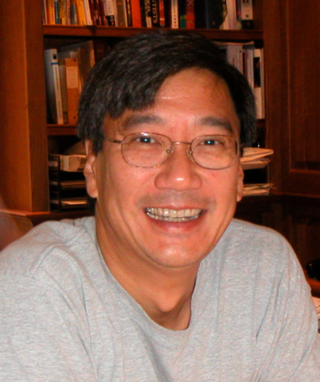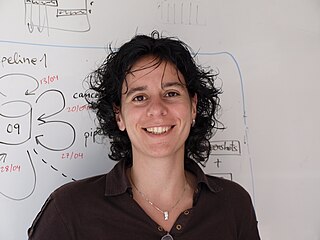Related Research Articles

The Rockefeller University is a private biomedical research and graduate-only university in New York City, New York. It focuses primarily on the biological and medical sciences and provides doctoral and postdoctoral education. It is classified as a "Special Focus – Research Institution". Rockefeller is the oldest biomedical research institute in the United States.

Cynthia Jane Kenyon is an American molecular biologist and biogerontologist known for her genetic dissection of aging in a widely used model organism, the roundworm Caenorhabditis elegans. She is the vice president of aging research at Calico Research Labs, and emeritus professor of biochemistry and biophysics at the University of California, San Francisco (UCSF).

Cornelia Isabella "Cori" Bargmann is an American neurobiologist. She is known for her work on the genetic and neural circuit mechanisms of behavior using C. elegans, particularly the mechanisms of olfaction in the worm. She has been elected to the National Academy of Sciences and had been a Howard Hughes Medical Institute investigator at UCSF and then Rockefeller University from 1995 to 2016. She was the Head of Science at the Chan Zuckerberg Initiative from 2016 to 2022. In 2012 she was awarded the $1 million Kavli Prize, and in 2013 the $3 million Breakthrough Prize in Life Sciences.
Alice Yen-Ping Ting is Taiwanese-born American chemist. She is a professor of genetics, of biology, and by courtesy, of chemistry at Stanford University. She is also a Chan Zuckerberg Biohub investigator and a member of the National Academy of Sciences.

Peter S. Kim is an American scientist. He was president of Merck Research Laboratories (MRL) 2003–2013 and is currently Virginia & D.K. Ludwig Professor of Biochemistry at Stanford University, Institute Scholar at Stanford ChEM-H, and Lead Investigator of the Infectious Disease Initiative at the Chan Zuckerberg Biohub.

Aviv Regev is a computational biologist and systems biologist and Executive Vice President and Head of Genentech Research and Early Development in Genentech/Roche. She is a core member at the Broad Institute of MIT and Harvard and professor at the Department of Biology of the Massachusetts Institute of Technology. Regev is a pioneer of single cell genomics and of computational and systems biology of gene regulatory circuits. She founded and leads the Human Cell Atlas project, together with Sarah Teichmann.
Zhijian "James" Chen is a Chinese-American biochemist and professor in the department of molecular biology at University of Texas Southwestern Medical Center. He is best known for his discovery of mechanisms by which nucleic acids trigger innate and autoimmune responses from the interior of a cell, work for which he received the 2019 Breakthrough Prize in Life Sciences.

The Foundation for the National Institutes of Health (FNIH) is a not-for-profit, 501(c)(3) charitable organization established by the US Congress in 1990. Located in North Bethesda, MD, the FNIH raises private-sector funds, and creates and manages alliances with public and private institutions in support of the mission of the National Institutes of Health (NIH).

Margaret ("Peggy") A. Goodell is an American scientist working in the field of stem cell research. Dr. Goodell is Chair of the Department of Molecular and Cellular Biology at Baylor College of Medicine, Director of the Stem Cell and Regenerative Medicine (STaR) Center, and a member of the National Academy of Medicine. She is best known for her discovery of a novel method to isolate adult stem cells.
Susan Wente is an American cell biologist and academic administrator currently serving as the 14th President of Wake Forest University. From 2014 to 2021 she was Provost and Vice Chancellor for Academic Affairs at Vanderbilt University. Between August 15, 2019 and June 30, 2020, she served as interim Chancellor at Vanderbilt.
Michael Andrew Fischbach is an American chemist, microbiologist, and geneticist. He is an associate professor of Bioengineering and ChEM-H Faculty Fellow at Stanford University and a Chan Zuckerberg Biohub Investigator.
Ruth Lehmann is a developmental and cell biologist. She is the Director of the Whitehead Institute for Biomedical Research. She previously was affiliated with the New York University School of Medicine, where she was the Director of the Skirball Institute of Biomolecular Medicine, the Laura and Isaac Perlmutter Professor of Cell Biology, and the Chair of the Department of Cell Biology. Her research focuses on germ cells and embryogenesis.
Katja Brose is an American neuroscientist and a science program officer at the Chan Zuckerberg Initiative (CZI) where she leads CZI's efforts in neurodegenerative diseases.

Núria López Bigas is a Spanish biologist and research professor with expertise in medical genetics, computational biology, and bioinformatics. She is an ICREA professor at Pompeu Fabra University and she also leads the Biomedical Genomics Research Group at the Institute for Research in Biomedicine in Barcelona, Spain. Her research is focused on developing computational approaches to investigate cancer genomes.

'Yasmine Belkaid; born August 1968) is an immunologist, currently President of the Institut Pasteur. She has Algerian citizenship by her father and French citizenship by her mother, and she also holds US citizenship.

Nicola J. Allen is a British neuroscientist. Allen studies the role of astrocytes in brain development, homeostasis, and aging. Her work uncovered the critical roles these cells play in brain plasticity and disease. Allen is currently an associate professor at the Salk Institute for Biological Studies and Hearst Foundation Development Chair.
Polly Fordyce is an Associate Professor of Genetics and Bioengineering and fellow of the ChEM-H Institute at Stanford University. Her laboratory's research focuses on developing and applying new microfluidic platforms for quantitative, high-throughput biophysics and biochemistry and single-cell genomics.
Ami Bhatt is an American physician-scientist who studies the link between blood cancers and the human gut microbiome. She holds associate professorships in Genetics and Medicine (Hematology) at Stanford University. She is a member of Stanford Bio-X, the Stanford Cancer Institute, Stanford Maternal & Child Health Research Institute (MCHRI), and Stanford ChEM-H. In addition, Bhatt is the co-founder of Global Oncology Inc., a nonprofit focused on providing quality oncologic treatment in resource-constrained settings.
Julie Baker is an American biologist who studies genetics and genomics, cell fate determination, and cellular communication. She is a professor of Genetics at the Stanford University School of Medicine and is a member of Stanford Bio-X and the Stanford Maternal & Child Health Research Institute (MCHRI).
Chantell Skye Evans is an American cell biologist who is a professor at Duke University. Her research looks to understand the dynamical processes of mitochondria and their role in neurodegenerative disease. In 2022, Popular Science named her as one of their "Brilliant 10" U.S. scientists and engineers.
References
- 1 2 3 "Brunet Lab: Molecular Basis of Longevity and Age Related Diseases". web.stanford.edu.
- ↑ "Anne Brunet - Stanford Medicine Profiles". med.stanford.edu.
- ↑ "CV" (PDF). web.stanford.edu.
- ↑ "Genes & Development -- Genes & Development Editorial Board".
- ↑ FranceinSF (12 December 2011). "Interview d'Anne Brunet - Chercheuse a Stanford" – via YouTube.
- ↑ News, Stanford. "Chan Zuckerberg Initiative awards $1.49 million to Stanford researchers | The Dish". news.stanford.edu. Retrieved 2021-01-02.
{{cite web}}:|last=has generic name (help) - ↑ "2022 Winners of the FNIH Lurie Prize in Biomedical Sciences Provide Powerful Contributions to Our Understanding of the Aging Process". fnih.org.